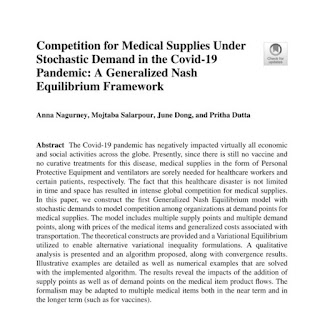The invasion of Ukraine by the Russians on February 24, 2022 is impacting food prices and food insecurity globally, creating major hardships with a pending hunger catastrophe.
I have worked on agricultural supply chains for quite a few years, since perishable product supply chains from food to medicines and blood are a passion of mine, and this is the theme that we wrote about in our Springer book, "Networks Against Time: Supply Chain Analytics for Perishable Products."
In my recent blogpost, I emphasized the importance of speaking out and writing about the war against Ukraine, a sovereign nation, that was unlawfully and unjustly invaded by the Russians. One must not forget what happened also in 2014 with Russia taking over Crimea and also moving into parts of eastern Ukraine. If one speaks out and writes, one is part of the resistance, as my courageous, incredible colleagues at the Kyiv School of Economics in Ukraine say.
Since my most recent post, I have had the honor of speaking to several media outlets. Of special interest to this audience I am sure is the article, Global Hunger Crisis Looms as War in Ukraine Sends Food Prices Soaring, by Susan D'Agostino for the Bulletin of Atomic Scientists that I was interviewed for.
In addition, the professional society of INFORMS hosted me and Professor Tim Lowe of the University of Iowa for a recent webinar on: How Supply Chain Disruptions are Impacting our Food Supply and Creating Food Insecurity. After an introduction, I began the webinar by speaking about Ukraine and the major disruptions to agriculture because of the Russian aggression. The recording of the webinar has now been posted on YouTube. I thank the outstanding Jeff Cohen and Ashley Smith of INFORMS for making this webinar possible to which folks from Capitol Hill were invited and other guests. I was thrilled to receive emails of thanks afterwards from as far as the UK and Mexico.
Earlier, I had spoken to FeedStuffs for this very informative segment, "Russia-Ukraine War and Global Food Security: What's at Stake?"
Many do not realize that the World Food Programme would, typically, purchase 50% of its wheat from Ukraine and, with the war exports of agricultural products from Ukraine now severely compromised with ports blocked; the Black Sea mined; the Russians even mining agricultural lands, and with transportation infrastructure seriously compromised due to the shelling and bombing plus the challenges of obtaining fuel for harvesting and sowing machinery as well as getting sufficient labor and even vehicles for transport. MENA countries (Middle Eastern and North Africa) also rely on grain exports from Ukraine, which is notable for its wheat, corn, barley, and sunflower oil. Agriculture is a major component of Ukraine's GDP and both developing countries, where hunger is always of concern, as well as developed ones (including several European ones), depend on food products grown in Ukraine. China also imports corn and sunflower oil from Ukraine and India imports agricultural products from Ukraine.
Throughout the pandemic, I have been writing and publishing on the importance of labor to supply chains, from agricultural ones to various medical ones, including PPEs, and the impacts of disruptions to labor on prices, profits, volumes of products, and even wages. Much of our work in this area, as well as other relevant publications, can be found on the Supernetwork Center site.
I also would like to share with you the outstanding webinar, from Ukraine, which included my colleagues from the Kyiv School of Economics, that I was able to view synchronously on March 31, 2022; the recording of which is now posted.
Everything must be done to stop Russia's war against Ukraine, which is also against humanity!













































